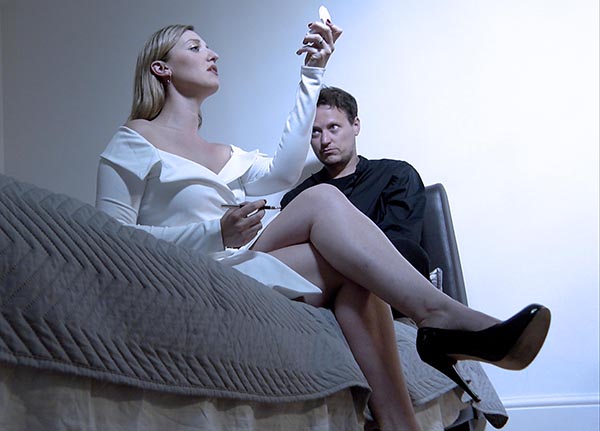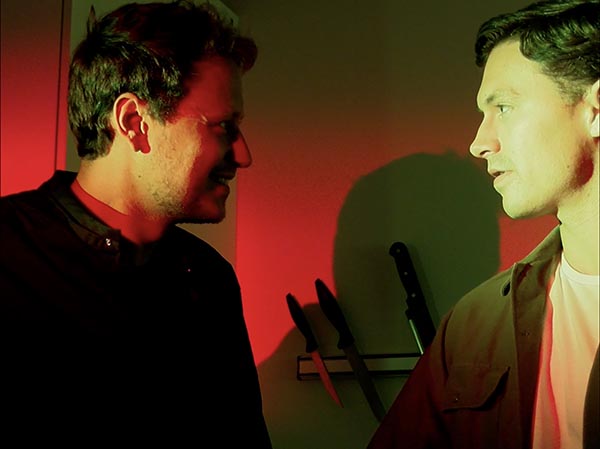Exit [2020]
Film Review
by Asaf Angel
Events take a sinister turn one night in London, when two very different couples arrive at a double-booked apartment. Actions have consequences and not all debts are paid for with money. Leaving, it’s harder than you think. [IMDb]

Written by Mathew Bayliss and directed by Michael Fausti, the story is delivered mainly by expressionistic means, engulfing a narrative core which essentially deals with the dynamics between the four main characters: Young couple Steve (Billy James Machin) and Michelle (Leonarda Sahani) and slightly older, more seasoned couple Christophe (Christophe Delesques) and Adrienne (Charlotte Gould).
It is apparent that Fausti weaved multiple layers around the plot. The film feels inspired by the work of directors like David Lynch and Stanley Kubrick. Dissonant personality traits between the two couples made for an intriguing display of group dynamics, keeping us on our toes, constantly curious about our characters: young and naïve commoners Steve and Michelle versus the foreign, well-traveled, posh and mysterious Christophe and Adrienne.

Fausti cleverly brews tension by seasoning our four characters with personality traits destined to clash and ignite conflict and intrigue, thus giving us an impressive display of human behaviour. There is a manipulative vein among the four, which allows us to somewhat understand their intent and weaknesses: what each character wants/needs, what some fear and more.

The plot as a whole gives us an additional display, outside the four characters, which gives expression and commentary on a greater evil: a sinister puppet master with an entirely separate agenda. I refrain from further delving into this story element, as it might introduce spoilers.
Additional characters played by Robert Alexander, Tony Denham and Michael Fausti himself, add plenty to the intrigue in their relatively short, yet essential, screen time. Shots and sequences which tease with hidden meaning for us to decipher are also abundant throughout.

Fausti places a lot of fucus and attention on the viewing experience, giving us many visuals which all serve a purpose. The general goal felt to have us constantly engage our minds, to try and make sense of the display. Also serving as the film’s editor, Fausti made some creative choices in an effort to achieve said goal. He riddled the film with visuals in an experimental capacity: invasive inter-cuts of erotic sequences and shots, fractions of moments, layering of elements/characters on top of each other and more.
Mostly taking place in a single location and somewhere in the 90s (judging by the type of technolgy and other props on display), it is apparent that much effort was invested into production design. From dialogue, wardrobe by Louise Nosbod, to props and more, attention to detail was admirably applied. The lighting theme is an entity all of its own. Coarse combinations of cyan, magenta and yellow set the tone of scenes, and at times even used to compliment a situation or a specific character’s intent.

In charge of Sound Design and Music, Nick Burns contributes a deliberately disturbing and overbearing soundtrack, rich with intense peaks, strategically laid out throughout the film. While viewing the film, Burns’ Sound felt to give a sense of unease around specific moments, as it climaxed around them. Coupled with the visuals, the sound design meshes well with Fausti’s vision.

Although the film gives a rich display of multilayered storytelling, it wasn’t easy to commit to, as the experimental elements of inter-cuts felt to be somewhat impulsive at times, which admittedly caused me to sometimes lose focus and have to regain it again. The heavy presence of the soundtrack also challenged me with immersing myself in the viewing experience. At certain points the film necessitates effort from the viewer, but the payoff is considerable.
As a whole, Exit feels to aim for an intense conundrum of an experience, with much made to be left open for interpretation. So before viewing it, know that it is not there only to entertain, but largely to make us, the viewers, think and unapologetically disturb our calm. Fausti refrains from giving answers, continually creating more questions and larger mystery as the plot progresses to and beyond its climax. By that, he succeeds in fulfilling what is in my mind, a fundamental attribute of any quality film: the likelihood that it will linger in your mind, long after you’re done watching.

Exit holds extra merit, as resource scarcity is often ubiquitous with indie filmmaking. Most of the time, indie filmmakers lack the funds to match the requirements of their vision, and so they must be resourceful, or otherwise compromise in order to complete a project. It is always inspiring to see indie filmmakers make such thorough and creative use of the means at their disposal. Michael Fausti and his team are to be commended for such an achievement.
A turbulent and thought provoking viewing experience. 7.7/10


